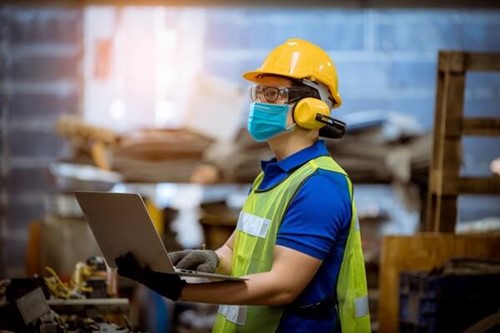Health & safety should be one of your top priorities as an employer. Especially when it comes to the wellbeing of your staff members. Which is why your business must provide sufficient first aid arrangements.
Proper first aid provisions can save lives, so it's necessary to train staff and make them aware of general first aid guidance.
Otherwise, you could put the safety of your employees at risk. As well as facing compensation claims, and even employment tribunals.
In this guide, we'll discuss first aid at work, your legal responsibility as an employer, and the first aid training available.

What is first aid in the workplace?
First aid at work is the act of immediately administering medical attention to an individual in the workplace. Typically when an accident or severe injury occurs, and before emergency services arrive.
What is the legal requirement for first aid at work?
According to the Health and Safety Executive (HSE), the First Aid Regulations 1981 states that employers must make sufficient first aid arrangements.
This includes providing adequate and appropriate first aid equipment, facilities and trained personnel. This ensures employees are given immediate attention - before emergency medical services arrive - if they face an injury or ill health at work.
Not every workplace is the same however, so different businesses will need to make different provisions. When it comes to first aid requirements, employers are usually split into two different types of workplace hazards:

Low-hazard workplaces
Low-hazard workplaces contain fewer health and safety risks. For example, a small team in an office-based firm is most likely a low-hazard workplace.
These workplaces usually require an appointed person to be in charge of first aid arrangements. This may include stocking the first aid box and calling emergency services. The appointed person does not need to have specific first aid training.
High-hazard workplaces
High-hazard workplaces typically contain significant health & safety risks. For example, builders in a construction firm, or welders using dangerous machinery. These types of workplaces may require more first aid arrangements, such as on-site trained first aiders.
If you're wondering what first aid arrangements your work requires, you should conduct a first aid needs assessment.
Conducting a first aid needs assessment
A first aid needs assessment is a review of a company's first aid cover. It typically evaluates the level of first aid a business requires. And should be done annually to keep up with workplace changes.
It must include an assessment of:
- The size of the business.
- The nature of the work taking place.
- Workplace hazards and other safety risks (as well as what special arrangements you might need to make for specific hazards).
- How far away the site is from emergency medical services.
- The work patterns of employees.
- First aiders.
- Any known high-risk health issues amongst staff, e.g. asthma, seizures, low blood sugar.
- Annual leave and other absences of first aiders or appointed persons.
- The distribution of the workforce.
- The needs of travelling, remote and lone workers.
- An organisation's history of accidents.
- Whether employees work on shared sites.
- The first aid provisions for non-employees. For example, passersby and members of the public.
Once you have evaluated all these factors - you can determine what first aid arrangements you need to make.
What type of first aid provision do you need to provide?
You must offer adequate first aid provision in your workplace. And what you need to provide depends on the results of your needs assessment.
Let's explore the different types of first aid provisions you can make.
Appointed persons
Every company must appoint someone to be in charge of first aid arrangements. Even if your needs assessment indicates that you do not require a trained first aider.
The appointed person must manage your first aid kits and regularly restock them. They are also in charge of looking after equipment and calling emergency services when necessary.
It may be ideal to appoint several people to be in charge of first aid arrangements. Even if you run a low-hazard workplace. This will ensure there is always someone to deal with any injuries at work, should your appointed person take annual leave.

First aid equipment
Low-hazard workplaces require a first aid kit at a minimum. So, if your business operates via multiple sites and offices, you will need a first aid box at each workplace.
If your assessment indicates that you need additional materials - such as foil blankets and cutting shears - you can store these separately.
First aid facilities
When more hazards are present in your workplace, you may need to offer suitable first aid facilities. This includes having a first aid room at work.
First aid rooms should:
- Be large enough to hold an examination or medical couch.
- Have washable surfaces and adequate heating, ventilation and lighting.
- Be kept clean, tidy and accessible. As well as being available for use at all times when employees are at work.
- Ideally, have a sink with hot and cold running water.
- Be positioned as near as possible to a point of access. This makes transport to hospital easier to manage.
First aid rooms should also have a notice on the door which advises the names and locations of first aiders. And contact details if the first aider is happy to provide them. You can also display this information in other notable places at work.
Report of accidents
You must make sure you report any and every accident or injury in the workplace. Keeping a record will help you understand the biggest health & safety risks. Especially if the same accidents keep happening.
Recording what materials you have used in the first aid kit will indicate what needs restocking.

What should be in your first aid kit?
HSE guidance states employers must have several different tools in their first aid box.
These include:
- A leaflet giving general guidance.
- Individually wrapped triangular bandages (preferably sterile).
- Two large sterile individually wrapped unmedicated wound dressings.
- Sterile eye pads.
- Individually wrapped sterile plasters.
- Two sterile eye pads.
- Disposable gloves.
- Six safety pins.
The HSE advises employers to check their first aid kits regularly, as many items have expiry dates. And some employees may forget to report incidents where they have used first aid kit materials.
Who can administer first aid at work?
Trained first aiders are legally able to perform first aid in the workplace. These are individuals who have undertaken adequate and appropriate first aid courses.
Trained first aiders must hold a certificate in either:
- First aid at work: This training is for higher risk workplaces. For example, a construction site.
- Emergency first aid at work: This training is for lower risk premises. For instance, a small office.
- Paediatric first aid: This is for workplaces where there is a risk of children or young person being injured or taken ill. For example, a school.
Who should you choose as a first aider at work?
When picking a first aider in your workplace, you must ensure the appointed person has the appropriate first aid skills. And has taken first aid training under the HSE's approved code.
This includes having in-depth knowledge of first aid and completing a relevant qualification. For example, a First Aid at Work or an Emergency First Aid at Work certificate.
Should employers provide first aid training?
No, it’s not a legal requirement for employers to provide first aid training. But, it never hurts anyone to train in first aid. And as an employer, you could even offer additional training for your employees.
If you choose to use an external training provider, you must ensure that they are a competent and experienced individual with proper credentials.

Get advice on first aid arrangements with Peninsula UK
Your business legally requires first aid arrangements. First aid arrangements will help your employees know their working environment can support them. Even if their health is in immediate danger.
Without safety first aid regulations, your employees may suffer severe accidents and injuries. Not to mention your business could also face financial loss, tribunal hearings and even reputational damage.
Peninsula offers you expert 24/7 HR advice and support, to help you enforce an effective first aid provision, manage first aid training, as well as offering guidance on implementing health & safety processes. Contact us on0800 028 2420
